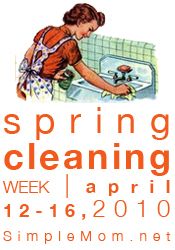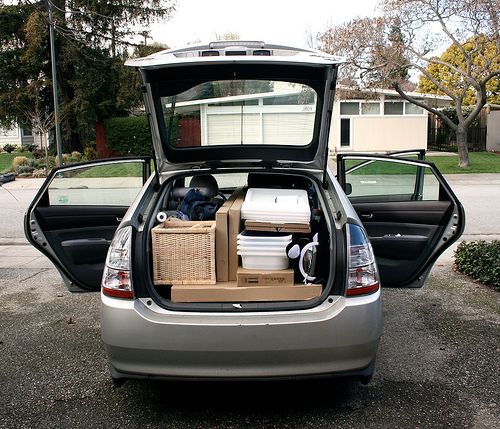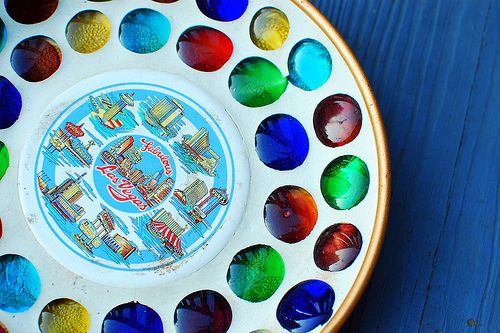Welcome to Spring Cleaning Week! This week will be devoted to the subject of giving our homes a fresh overhaul to prepare for the warmer months.
Unlike last year, our family just made a major move and I’m seven and a half months pregnant. So I’m not devoting a full two weeks to every task described in my e-book about the ten-day process of spring cleaning. Instead, I’m going to write about a few of the ideas behind spring cleaning — what makes it work, a few tips for different spaces in each home, and how to customize it for your home.

I’d still love to hear your progress as you spring clean over the next few weeks. Feel free to link to any of the upcoming spring cleaning posts with before and after photos and posts from your blog!
My e-book describes a simple three-step process to use each of the ten days: decluttering, cleaning, and organizing. No rocket science here.
Today, we’re discussing decluttering.
What is decluttering, exactly?
For me, the definition of declutteirng stems from the well-known William Morris quote I shared on Friday:
“Have nothing in your homes that you do not know to be useful or believe to be beautiful.”
Decluttering: Getting rid of anything that’s not useful or beautiful.
That’s it. It’s making a point to take the un-useful or the non-beautiful items out of our homes by either selling, giving, or tossing.
The definition is pretty simple. So why isn’t the act of decluttering easier?
Here are the most common roadblocks to decluttering, and how they ultimately keep you from making your home a haven.
1. “I don’t want to get rid of it because I might need it later.”

Underlying message behind this belief: A responsible person is immediately prepared for all circumstances, even if that circumstance is rare.
Why it hinders us: When we give an item significance by storing it in our homes, we are saying that the item has value. It “passes the test,” and is allowed past the front door. But if an item is seldom (or never) used, it doesn’t really have much value. So when an unvaluable item is treated as though it is valuable… clutter happens.
The result of this belief: An overfill of items that, while potentially useful in their essence, inevitably cause a backlog of stuff that keeps us from knowing where things are, enjoying our space, and appreciating the things that are truly useful.
(How often have you known you owned something, but when it finally came time to putting it to use, you no longer knew what it was? That’s a sure sign you have too much stuff.)
Change your thinking to: “Except for truly seasonal items (holiday decor, gardening supplies, etc.), I will allow only the things that I use at least once a month through our door. Should I need anything exceptional down the road, I’ll manage to find it.”
2. “I can’t get rid of it because someone gave it to me, and I don’t want to hurt his or her feelings.”

Underlying message behind this belief: I’m going to prioritize someone else’s conditional happiness, even if it hinders my family’s overall well-being. Also — Relationships depend on stuff.
Why it hinders us: For one, it assumes that someone really will be hurt if we got rid of something, when this very well may not be the case. But even if they would, it hinders us because it’s an unhealthy boundary in the expectations of our relationships. Keeping something you don’t need or love only to please someone else is not a healthy way to act in any relationship.
The result of this belief: Items in our home that serve no purpose, either asthetically or purposefully. This could also lead to bitterness towards the gift-giver, frustration, and a lack of power in our own dwellings.
Change your thinking to: “Except for items that truly have value (such as family heirlooms that have been passed down to me for a specific reason), I won’t use someone else’s conditional happiness as a barometer for whether something should be kept in my house.”
3. “I paid good money for this.” Also, “I’m waiting for this to appreciate in value.”

Underlying message behind this belief: Even though an item isn’t useful or beautiful to me, I should hold on to it because it might be financially valuable.
Why it hinders us: We’re placing a higher priority on what other people, or what society thinks, than what’s actually important to our family.
The result of this belief: We’re paying rent to house an unloved item instead of potentially cashing in and getting money for the thing. All it takes is a simple look on eBay to see if something has value — and if it doesn’t, then it can be given away or donated.
Change your thinking to: “I’m going to do simple research and find out if this thing really has financial value. If it does, I’ll get my money’s worth. If it doesn’t, it’s not worth the stress and clutter it adds to our home. Out it goes.”
4. “I’ve had it a really long time.” Or, “I got this at a [specific location] or [specific time in my life], and if I get rid of it, that moment will lose significance.”

Underlying message behind this belief: Even though I don’t love or find value in this thing anymore, I did at one time. Therefore, I should hold on to it because it once held value to me. Also — My memories are held up in things, so as long as I hold on to the thing from the past, I’ll remember the event. Should I lose the item, I’ll lose the memory.
Why it hinders us: We’re literally holding on to the past. We’re giving an item more power than it really has (inanimate objects only have as power as we give them), and we credit it with fueling our memories.
The result of this belief: A cluttered home full of stuff from the past, which keeps us from living in the present and preparing for the future. Whether it’s a souvenir from our 6th grade science field trip, 200 drawings from our son’s first three years, or a dried-up bouquet from our stint as bridesmaid for a college roommate we never see, these things keep us from adding life to our home.
Change your thinking to: “I’m going to sort through these items I’ve held on to for no other reason than my memories. I’ll reflect on the memory as I hold the item for a few seconds, and then I’ll let it go — after all, it’s not really where my memory is housed. I could take a digital photo of the thing, if I’m really hesitant. But it really doesn’t deserve the space I’m giving it in my home.”
Application for Spring Cleaning Week
Take a few moments and journal your thoughts about your toughest roadblocks. How would your home be different if you got rid of the things you don’t need? Close your eyes and visualize the “after” of your decluttered home. Perhaps even sketch out some ideas of what your place would look like clutter-free.
In short, motivate yourself that a clutter-free home is worth it.
As you go through the next ten days, decluttering, cleaning, and organizing different spots in your home, give yourself power by getting rid of everything that’s not useful or lovely. Anything less doesn’t deserve the valuable real estate in your home.
Which roadblocks stop you the most? Have any more to add?


